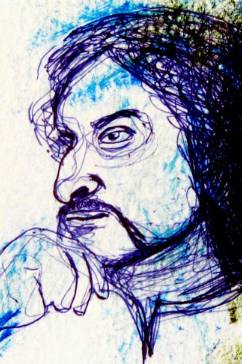Vivek Narayanan’s After is written after Valmiki’s Ramayana, both chronologically and thematically.
In the book’s second poem, “Valmiki Discovers the Shloka Meter,” Narayanan mimics the First Poet, who also inserted himself into his work, as he discovers a new voice with which to rework a story over two thousand years old.
This is no mere translation, and arguably, it’s not entirely a retelling either. Every so often, a fictional ancient sword will be depicted alongside a subsonic missile, a poem will be narrated beneath an erratic “contemporary music score,” a war of epic scale will be juxtaposed with real-world government sponsored torture and murder. As a collection, After knows it follows in the footsteps of hundreds of Ramayanas, but it’s also certain that this eternal narrative still has much to say, especially to the present day.

Vivek Narayanan, a Colgate alumnus, was born in India to Tamil parents, though he grew up primarily in Zambia. He has a master’s in cultural anthropology and a master’s in creative writing, from Stanford University and Boston University, respectively.
He has taught at the University of KwaZulu-Natal worked at Sarai-CSDS, a center for experimental practice and theory in New Delhi, in addition to being a Co-editor of Almost Island, an India-based international literary journal from 2007-2019. Narayanan's books of poems include Universal Beach, Life and Times of Mr S and, most recently, After (NYRB Poets, 2022) and The Kuruntokai and its Mirror (Hanuman Editions, 2024).
His poems, short stories, translations, and essays have appeared in a wide variety of journals as well as anthologies. He has been a Radcliffe Fellow (2013-2014) and a Cullman Fellow at the New York Public Library (2015-2016). At George Mason University, Narayanan teaches the MFA program and sits on the board of the Cheuse International Writers Center. He is also a Co-Editorial Director of the website Poetry Daily, housed at George Mason.
In Narayanan’s words, “The point of bringing across has always been to make a source and its possibilities come fully alive in each new language and, importantly, each new era, to be answerable to the questions of the present.” The Ramayana, in its many tellings, has always been a prolific text in discussions of politics, war, violence, gender, integrity, among many other subjects. Where some versions attempt to dial down the complexities and challenging moments of the original, After abounds in them and assures unfamiliar and distant audiences that this story is meant for them, too, and for now.
Author at Colgate
Join us in person or via Zoom on Thursday, September 25, for Vivek Narayanan’s reading and book signing. This event will be hosted by Peter Balakian and also include poets Jasmine Bailey and Matthew Cooperman. This event will take place at 4:30 ET in Persson Auditorium. Refreshments will be available.
... –O pitiful Simians this is
neither the placeof death nor that
of life norof anything
In between:it simply is
poor SimiansNot easy to leave
but if you so chooseI can help…
After